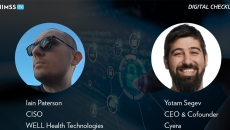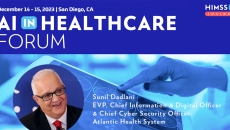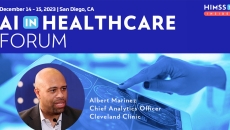Videos
One closed and declared bankruptcy because, while it was able to deliver care, it was unable to do billing, says Iain Paterson of WELL Health Technologies, who, with Yotam Segev of Cyera, discussed the benefits of moving to the cloud.
At HIMSS AI in Healthcare Forum, one session about Atlantic Health System's AI rollout focused on a watershed moment of smart machines and humans integrating, says Sunil Dadlani, EVP and chief information and digital officer.
Beckman Coulter uses TriageGo, AI and machine learning to recommend triage acuity, says Sophia Henry, clinical consultant for the company.
GenAI can help solve healthcare challenges, but at some point it becomes hard to explain what it's doing, says Dr. Rebecca G. Mishuris, CMIO and VP at Mass General Brigham.
UNC Health first made investments on AI in 2016, with the early development work focused on care redesign, algorithms and sepsis, says University of North Carolina Health Chief Analytics Officer Rachini Moosavi.
AI innovation at the Cleveland Clinic is in its early days, but there are a number of initiatives focused on the pathology and lab areas and supporting physicians to optimize their workflows, says Chief Analytics Officer Albert Marinez.
Various agencies are regulating different aspects of AI, says Bryant Godfrey, partner at Foley Hoag.
Putting policy and procedures into place is one of the best ways to navigate compliance in the novel area between healthcare and technology, says Sara Helene Shanti, a partner in Sheppard Mullin's Corporate Practice Group in Chicago.
AI can make healthcare more human by alleviating much of the burden, says Jay Rughani, investment partner at a16z, who, with colleagues recently released, "AI: The Teammate Clinicians Need."
The Trusted Exchange Framework and Common Agreement is now live, but the challenge is FHIR in TEFCA, says Don Rucker, chief strategy officer for 1upHealth and former national coordinator for Health IT at HHS.









